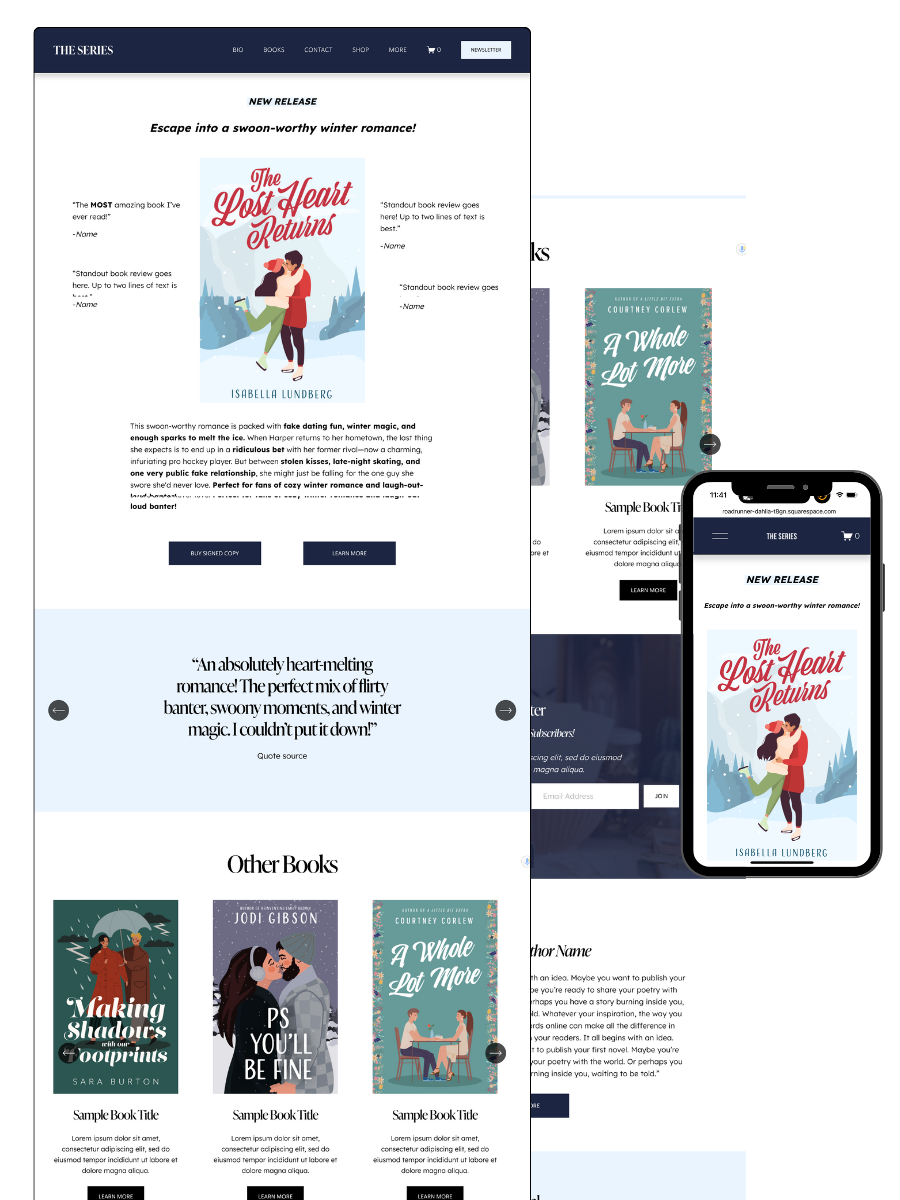SEO for Authors – Get Found Online & Sell More Books!
If you want more readers to find your books, Google needs to know you exist. Think about it—when someone searches for a book like yours, wouldn’t it be nice if your name popped up? That’s where SEO comes in!
And no, you don’t need to be some tech genius to make it work. With a few simple tweaks—like using the right keywords, optimizing your website, and making Google love your content—you can get more eyes on your books, grow your audience, and sell more copies!
No complicated jargon, no overwhelm—just straightforward SEO strategies for authors and writers that work!
Before we dive in, download my FREE author website checklist!
What is SEO and Why Do Authors Need It?
Let’s be real—your book can’t change lives if no one knows it exists. That’s where SEO (a.k.a. Search Engine Optimization) comes in. SEO is what helps people find you on Google when they’re searching for books like yours.
How Does Author SEO Work?
Search engines (like Google) scan the internet 24/7, trying to match people’s searches with the best possible content. The better your website and content are optimized, the higher you rank in search results—which means more readers finding you, more books sold, and more fans who love your work (whoop whoop!).
Here’s what Google looks for when deciding where to rank your website:
Relevant keywords – The words and phrases people are actually searching for.
Quality content – Helpful, interesting content that keeps readers engaged.
Fast, mobile-friendly websites – Because nobody has time for slow-loading pages.
Links from other websites – A.k.a. “credibility points” that tell Google you’re legit.
Why SEO Matters for Authors
Writing a book is one thing. Getting people to buy it? That’s another. SEO helps your website, blog, and book pages show up when people search for:
Books in your genre
Topics you write about
Your name (if you don’t rank for your own name, we need to fix that ASAP!)
Without SEO, you’re relying on hope, or word of mouth to get discovered. With SEO? You’re giving your book a fighting chance to be found, read, and loved!
SEO Myths That Hold Writers Back (Let’s Bust Them!)
“SEO is only for big companies.” Nope! Even indie authors can rank on Google.
“I need to be an expert to do SEO.” If you can write a book, you can handle SEO.
“Social media is enough.” Platforms change, but Google searches never stop.
If you want people to find you, SEO needs to be part of your strategy. And don’t worry—I’ll walk you through exactly how to do it.
Don’t have a website yet? No problem! Book a Website in a Day and get a custom author website in ONE DAY!
The Foundation of Author SEO – Optimizing Your Website
1. Choosing the Right Keywords – What Are Readers Searching For?
SEO starts with knowing what your readers are typing into Google. If someone is searching for “best fantasy books with strong female leads” and you’ve written the perfect book for them—but your site doesn’t use those words anywhere—you’re invisible.
Here’s how to find the right keywords:
Think like your ideal reader—what would they type to find a book like yours?
Use Google Autocomplete (start typing in Google and see what it suggests).
Try free tools like Ubersuggest or Answer the Public for keyword ideas.
Look at Amazon categories and book descriptions—what words are authors in your genre using?
Once you’ve found your keywords, use them naturally throughout your site—especially in page titles, blog posts, and book descriptions.
2. Metadata Matters – Optimizing Page Titles, Meta Descriptions & URLs
Metadata is your website’s elevator pitch to search engines. It’s the first thing people see in search results, so it needs to be clear, engaging, and keyword-rich.
Page Titles: Include your main keyword and be descriptive. Example:
“Best Fantasy Books for Teens | Author Jane Doe” (clear and searchable)
“Magical Worlds Await – Read My Novel” (too vague, doesn’t tell Google what the page is about)
Meta Descriptions: This is the preview text under your page title in search results. It should be engaging, informative, and include your keywords. Example:
“Discover the best fantasy books with strong female leads. Explore my latest novel, get writing tips, and join my email list for exclusive content.”
URLs: Keep them short, readable, and keyword-rich. Example:
www.yoursite.com/fantasy-books-for-teens instead of www.yoursite.com/page123
3. Structuring Your Website for SEO – Easy Navigation = Higher Rankings
If your author website is cluttered or difficult to navigate, visitors won’t stay long, and search engines won’t rank it highly. A well-structured author website improves both user experience and your author SEO.
Here’s how to structure your site for better rankings:
Clear navigation: Keep your menu simple with essential pages like About, Books, Blog, and Contact.
Internal linking: Link between pages on your site. If you mention your book in a blog post, link to your book page.
Mobile-friendly design: Most visitors will be on their phones. If your site isn’t mobile-friendly, rankings and engagement will suffer.
Fast-loading pages: Slow websites hurt SEO. Compress images, limit unnecessary plugins, and choose a fast hosting provider.
Related: How to Design an Engaging Author Website on Squarespace
4. The Power of Blogging for SEO – Keep Your Site Active & Rank Higher
Search engines favor websites that are updated regularly. A blog is one of the best ways to keep your site fresh and relevant.
Write content based on what your readers are searching for. Example: “How to Write a Fantasy Novel” or “Best Mystery Books for Fans of Agatha Christie.”
Use keywords naturally—don’t force them in.
Link to your own pages, such as book pages, your about page, or past blog posts, to keep visitors engaged.
Share your posts on social media to drive more traffic, which can help improve rankings.
Even one post a month can make a big difference in keeping your site active and ranking well.
Social Media & SEO – How They Work Together
Social media and SEO aren’t separate strategies—they feed into each other.
While social platforms don’t directly impact search rankings, they increase visibility, drive traffic to your site, and help you get discovered by new readers. The key is knowing how to use them together effectively.
Driving Traffic to Your Author Website
Your website should be the place where all your social media efforts lead. Instead of relying solely on social platforms (where algorithms change constantly), direct followers to your website where they can sign up for your email list, explore your books, and engage with your content on your terms.
Ways to drive social media traffic to your site:
Link to your blog posts, book pages, and newsletter signups in your bio.
Use call-to-actions in posts to encourage visits (“Read the full story on my site!”).
Share new website content across your platforms consistently.
Social Media SEO Best Practices
Social platforms have search functions too. Optimizing your social media content helps you show up when people are searching for books, authors, and writing-related topics.
Hashtags: Use genre-specific and reader-friendly hashtags like #HistoricalFictionReads or #IndieAuthor instead of just #Books.
Keywords in Captions & Profiles: Treat your social bio like an SEO-friendly tagline. Instead of “Author of fantasy books,” try “Fantasy author creating epic worlds & unforgettable characters.”
Links: Regularly update your bio link to direct traffic to relevant book pages, new blog posts, or special offers.
Check out this article all about using social media to drive traffic to your author website!
Repurposing Content for Maximum Visibility
Creating content from scratch every time is exhausting. Instead, repurpose your website content into bite-sized social media posts to reach more people.
Turn blog posts into Twitter threads or LinkedIn articles.
Share key points from your latest post as an Instagram carousel.
Convert book excerpts into short-form videos on TikTok or Reels.
Use Pinterest to pin your blog posts and drive long-term traffic to your site.
By integrating SEO with social media, you’re expanding your reach while making sure the content you’ve already created works harder for you.
SEO Strategies for Self-Published vs. Traditionally Published Authors
Whether you're self-published or working with a traditional publisher, SEO can help you get more visibility, attract readers, and sell more books. The approach, however, looks a little different depending on your publishing path.
SEO for Self-Published Authors
When you self-publish, you're responsible for your book’s marketing, and SEO is a game-changer for getting your book in front of the right readers.
Here’s how to boost your rankings on Amazon, Google, and book directories:
Amazon SEO: Choose keywords and categories wisely so your book appears in relevant searches. Use keyword-rich descriptions and add search-friendly phrases to your book title and subtitle when possible.
Google SEO: Optimize your author website, book landing pages, and blog posts with keywords your audience is searching for.
Book Directories: Get your book listed on Goodreads, BookBub, and genre-specific directories—each listing increases your chances of discovery.
Reviews Matter: The more positive reviews your book gets, the more platforms like Amazon and Goodreads will recommend it to new readers.
SEO for Traditionally Published Authors
Even with a publisher handling some of your marketing, your online presence still matters. Readers, journalists, and event organizers will Google your name, so your website and personal branding should be optimized to rank high in search results.
Here’s how to use SEO for personal branding and book launches:
Optimize your author website with strong metadata, blog posts, and book pages to keep it ranking well.
Create content around your book launch—interviews, guest blogs, and podcast appearances all contribute to SEO by earning backlinks to your site.
Ensure your publisher’s book page links back to your own site, so people searching for your book also find you.
SEO Tools & Resources for Authors
SEO doesn’t have to be overwhelming. These tools make it easier to track rankings, find the right keywords, and improve your visibility:
Google Search Console – Tracks how your site appears in search results and helps you improve performance.
Ubersuggest – A free tool for keyword research and content ideas.
Publisher Rocket – Helps self-published authors find high-ranking Amazon keywords.
Yoast SEO (for WordPress users) – Optimizes blog posts and web pages for search engines.
Answer the Public – Generates content ideas based on what people are searching for.
No matter how you publish, SEO is a long-term investment in your success. The more you optimize, the easier it is for readers to find your work, follow your journey, and become lifelong fans.
If you’d rather outsource to an SEO professional, I’d recommend checking out this SEO Setup service.
How to Get Started with SEO Today
SEO isn’t just about ranking higher on Google—it’s about making it easy for the right readers to find you, follow you, and buy your books. Small tweaks like optimizing your website, using smart keywords, and creating fresh content can have a big impact over time.
The best part? Once set up, SEO keeps working in the background while you focus on writing!
But if you’re ready to go beyond DIY and want a custom, professionally designed author website that’s not only beautiful but also built with SEO in mind, I can help. Let’s create a website that reflects your brand, engages readers, and helps your books get discovered.








